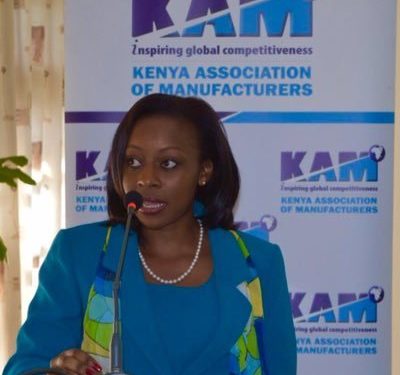Manufacturers have spelt a raft of measures that they want the government to adopt to make locally manufactured goods competitive in the region.
One of the measures is the review of the Standard Gauge Railway (SGR) tariff that has made the cost of imported raw materials more costly. The manufacturing sector is currently at a 12.8% cost disadvantage on most goods manufactured in the country compared to our neighboring countries.
“Last-mile costs need to be reviewed as they are a key factor in the increase of overall operational costs for businesses,” manufacturers lobby group, Kenya Association of Manufacturers said in a recent statement.
All imported goods destined for Nairobi are today transported through the SGR and apart from the rates being higher than what they paid road transporters; they have to incur the last mile transport, which can go as high as Sh. 17,000 per trip.
Another cost element is high storage charges due to delays in clearing cargo through the ICD in Nairobi which the industry players blames on both the partner government agencies involved in clearing goods as well as clearing agents and importers who delays in lodging clearance documents.
The status report of the ICD for the week that ended on 12th February indicated that it was only 48 percent of the goods that did not attract storage charges at ICD.
Those cleared in 5- 10 days stood at 6 percent while 22 percent of the goods was cleared between 11-21 days. About 14 percent of the goods were cleared after 21 days, meaning that the cargo attracted both the storage charges as well as Custom Warehouse Rent (CWR).
Before the SGR became operational, importers relied on goodwill they had created with the Container Freight Stations (CFSs) operators in Mombasa that served as distributive centers, allowing storage of goods for up to 60 days.
KAM will this year also push for enabling stability of the macroeconomic environment.
“The National Treasury should sustain the ongoing fiscal consolidation measures and ensure that the fiscal deficit is reduced to 3% of GDP in the 2022/23 financial year,” KAM statement read in part.
They will also be pushing for the design of coherent and cohesive policies between government departments and also between the National Government and Counties. This will enhance effective and transparent policy execution
Kenya needs to push for the finalization of the amendments on the Non-Tariff Barriers Act and KAM will advocate for the ratification of the Tripartite Free Trade Area (TFTA), an African free trade agreement between the Common Market for Eastern and Southern Africa (COMESA), Southern African Development Community (SADC) and East African Community (EAC).[
KAM made this recommendation when it launched the Manufacturing Priority Agenda (MPA) 2020 last week.
Speaking during the launch, Cabinet Secretary for Interior and Coordination of National Government, Dr Fred Matiang’i said that the government is working to streamline its operations to create a conducive business environment in the country.
“Previously, the need for approval from various agencies increased the cost of doing business and was an opportunity for rent-seeking. The one-stop-shop for service delivery for businesses will change this. We have also held engagements with county governments to harmonize county cess, fees and charges to reduce the cost of doing business amongst counties,” noted Dr Matiang’i.
He also said that currently, the government and private sector have the most responsive relationship in Kenya’s history, adding that, “We shall engage the private sector from the grassroots. It is also time that we worked together to promote ethical business practices for our country’s economic growth.”
KAM Chair, Mr Sachen Gudka observed that Kenya needs to urgently rethink its economic trajectory by making a swift about-turn to prevent further decline and stimulate growth.
“The country needs to create a space that provides the much-needed stimulus for industry to grow, become competitive and increase productivity.
The 2020 MPA themed “Establishing a competitive manufacturing-led economy for job and wealth creation” is a how-to guide on how this space can be created, ” said Mr Sachen.
He added that the industry is currently operating in a very constrained fiscal environment adding, “If we are able to achieve at least 50 percent of industry asks this year, the change in the economy will be immediate and far-reaching. Progressive economic policies are meant to create an environment for industry to thrive, thus increasing government revenue.”
For any feedback, contacts us via editorial@feaffa.com / info@feaffa.com; Mobile: +254703971679 / +254733780240





